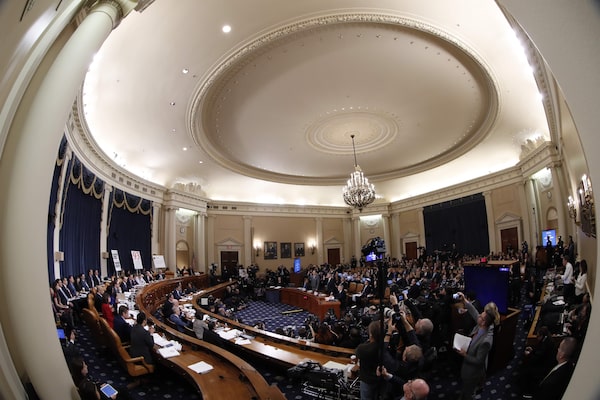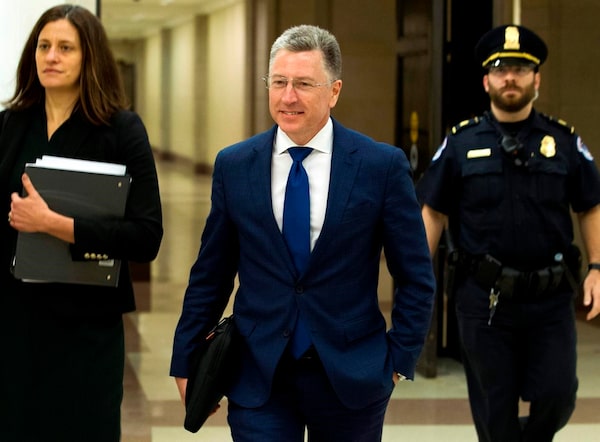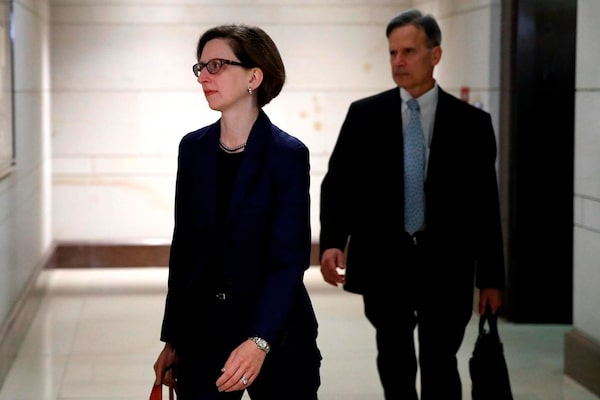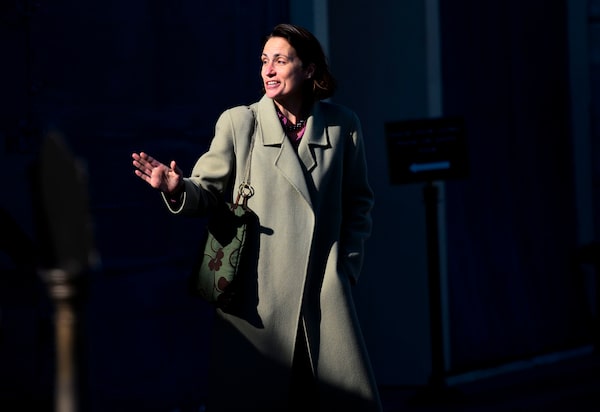
Last Wednesday, members of the U.S. House of Representatives met in this room to hear from ex-diplomat William Taylor and career foreign officer George Kent in the first public hearings in the Trump impeachment inquiry. The lawmakers have a new slate of witnesses this week.ALEX BRANDON/AFP via Getty Images
U.S. Congress launches its second week of public impeachment hearings with eight new witnesses. Gordon Sondland, the U.S. ambassador to the European Union, is the most anticipated witness of the week – the central Trump administration figure in an alleged campaign to withhold crucial military aid in order to press Ukraine to investigate President Donald Trump’s political rivals. Here’s what you need to know about the week ahead in impeachment.
Table of contents
Tuesday morning: Williams, Vindman • Tuesday afternoon: Volker, Morrison • Wednesday morning: Sondland • Wednesday afternoon: Cooper, Hale • Thursday: Hill
Tuesday morning
Jennifer Williams, special adviser on Europe and Russia in the office of Vice-President Mike Pence
Tom Brenner/Reuters
As an aide to Mr. Pence, Ms. Williams has first-hand knowledge of the internal White House deliberations over Ukraine.
She attended a meeting between Mr. Pence and Ukrainian President Volodymyr Zelensky in Warsaw in early September, testifying that Mr. Zelensky had immediately raised the issue of delayed U.S. military aid to Ukraine. Mr. Pence offered little commitment beyond saying that the assistance would be released soon.
Ms. Williams was also one of several people set to testify this week who listened to the July 25 phone call between Mr. Trump and Mr. Zelensky that sparked the Democrats’ impeachment inquiry. She told a closed-door House intelligence committee hearing she thought it was “inappropriate” for Mr. Trump to put pressure on the Ukrainian President to pursue investigations involving U.S. politics.
Transript: Ms. Williams's Nov. 7 testimony to the closed-door hearings
Alexander Vindman, director for European affairs at the National Security Council
Tom Brenner/Reuters
A decorated veteran wounded in Iraq by a roadside bomb, the Ukrainian-born Lieutenant-Colonel Vindman joined the National Security Council from the U.S. Army last year as its top expert on Ukraine.
Lt.-Col. Vindman could prove to be an important witness for the Democrat-led inquiry. He was directly involved in meetings with senior administration officials about the U.S. policy toward Ukraine, including drafting Mr. Trump’s letter congratulating Mr. Zelensky on his election. He was one of several people with the power to suggest changes to a transcript of the July 25 call between the two presidents as part of a routine review.
In closed-door testimony, Lt.-Col. Vindman described his growing alarm at a campaign orchestrated by Mr. Trump’s close allies to put pressure on Ukraine to investigate the President’s political rivals.
Shortly after he learned that military aid to Ukraine was on hold, Lt.-Col. Vindman attended a meeting between U.S. and Ukrainian officials where U.S. ambassador to the European Union Gordon Sondland pressed Ukraine to publicly announce investigations of former vice-president Joe Biden and alleged Ukrainian interference in the 2016 U.S. election in exchange for a meeting with President Trump. Aid to Ukraine was not discussed before then-national security adviser John Bolton abruptly shut down the meeting.
Lt.-Col. Vindman also testified that during the July 25 phone call, Mr. Zelensky told Mr. Trump he would appoint a new prosecutor-general who would specifically investigate Burisma, a Ukrainian energy company that had appointed Mr. Biden’s son Hunter to its board of directors. The name of the company was removed from the transcript when it was released publicly in September.
Lt.-Col. Vindman reported his concerns about a campaign to put pressure on Ukraine to the National Security Council’s top lawyer, John Eisenberg, who ordered that access to the transcript be restricted out of concern that it could damage U.S.-Ukraine relations if it was leaked.
Transript: Lt.-Col. Vindman Oct. 29 testimony to the closed-door hearings
Tuesday afternoon
Kurt Volker, former U.S. special representative for Ukraine

Jose Luis Magana/The Associated Press
Mr. Volker had a long foreign-service career serving mainly Republican administrations, including as U.S. ambassador to NATO under President George W. Bush. He left government for the private sector in 2009 but was called back in 2017 by then-secretary of state Rex Tillerson to serve as a special envoy to Ukraine, a part-time volunteer position.
Mr. Volker was a pivotal witness early in the Democrat-led impeachment inquiry, releasing a series of text messages that included Mr. Sondland and Bill Taylor, the top U.S. diplomat in Ukraine, discussing why security assistance to the country was being withheld.
Mr. Volker’s testimony is likely to be critical to the inquiry. He was part of a small group of officials who made up an informal channel of communication between Ukraine and Mr. Trump’s allies, and worked to press Ukraine to commit publicly to the investigations that Mr. Trump wanted.
In closed-door testimony, Mr. Volker described how he enlisted the help of Rudy Giuliani, hoping to discourage Mr. Trump’s personal lawyer from spreading false narratives that risked turning the President against the new Ukrainian government.
He worked closely with Mr. Giuliani to draft a public statement for Mr. Zelensky committing to announce investigations into Burisma and a widely debunked theory of Ukrainian interference in the 2016 U.S. elections, while privately warning Ukrainian officials to steer clear of U.S. domestic politics.
Mr. Volker resigned after the whistle-blower’s complaint was made public in September.
Transript: Mr. Volker's Oct. 3 testimony to the closed-door hearings
Timothy Morrison, former National Security Council senior adviser on Russia and Europe
Tom Brenner/Reuters
A long-time Republican congressional aide, Mr. Morrison took over as the White House’s top security expert on Russia from Fiona Hill in August and worked closely with Mr. Bolton until the National Security Adviser’s resignation in September.
Mr. Bolton has so far refused to appear before the inquiry and his attorneys are seeking a court order on whether he should be compelled to testify. That leaves Mr. Morrison as one of the few witnesses who has insight into Mr. Bolton’s dealings with the President over Ukraine policy.
A transcript released on the weekend revealed that Mr. Morrison told investigators that Mr. Bolton had warned him to stay away from an unofficial channel of communication between the White House and Ukraine led by Mr. Sondland, who appeared to be acting on Mr. Trump’s orders when he pushed for Ukraine to open investigations into the Bidens. Mr. Bolton also met privately with the President to convince him to release aid to Ukraine, but came away empty-handed.
Mr. Morrison also told investigators about a meeting with aides to Mr. Zelensky in Warsaw where Mr. Sondland instructed Ukrainians to publicly announce investigations into Burisma and the 2016 election as a way to get the White House to release frozen military assistance. The revelation prompted Mr. Sondland to revise his own testimony.
But the testimony of Mr. Morrison, who resigned at the end of October, also undercuts a key Democratic narrative that many senior White House officials were alarmed by the July 25 phone call between the U.S. and Ukrainian Presidents, and rushed to store it in a hard-to-access computer system.
Mr. Morrison told investigators he was not concerned about the call and asked National Security Council lawyers to restrict access to it mainly because he feared it could leak out. But he said a reconstructed transcript of the call was placed in a secure server by accident by department staff who had misinterpreted the request.
Transript: Mr. Morrison's Oct. 31 testimony to the closed-door hearings
Wednesday morning
Gordon Sondland, U.S. ambassador to the European Union
T.J. Kirkpatrick/The New York Times
A wealthy Oregon hotelier who donated US$1-million to Mr. Trump’s inauguration, Gordon Sondland is likely to be the inquiry’s most important witness to testify this week.
Mr. Sondland is among the few witnesses who was in regular contact with Mr. Trump and directly pushed Ukrainian officials to commit to investigations into U.S. political affairs. His role as an intermediary between the President and the Zelensky government in negotiations over the frozen security assistance are key to the impeachment investigation.
Several career diplomats testified that it was unusual for someone like Mr. Sondland, a political appointee whose position was mainly focused on U.S.-European trade relations, to have been given such authority over policy toward Ukraine.
In closed-door testimony, Mr. Sondland initially denied knowing why the security assistance to Ukraine was delayed and said that Mr. Trump had told him he did not consider the political investigations to be “quid pro quo” for financial aid to Ukraine.
But he later revised his testimony, saying that other witnesses had “refreshed my recollection” and that he had told an aide to Mr. Zelensky that Ukraine needed to commit to the investigations Mr. Trump wanted in order to receive the military assistance.
Expect Democrats to press Mr. Sondland about his discussions with the President and his meetings with Ukrainian officials, while Republicans will likely grill him on why he revised his testimony.
Mr. Sondland will also likely have to answer questions about the testimony of David Holmes, an employee of the U.S. embassy in Ukraine. He told investigators in a private deposition on Friday that he had overheard a phone call between Mr. Trump and Mr. Sondland, who later told him the President cared more about investigations of Biden than the fate of Ukraine.
Transript: Mr. Sondland's Oct. 17 testimony to the closed-door hearings
Wednesday afternoon
Laura Cooper, deputy assistant secretary of defense for Russian, Ukrainian and Eurasian affairs

Patrick Semansky/The Associated Press
A Pentagon official, Ms. Cooper oversaw nearly US$400-million in security assistance to Ukraine and could offer important details about why the funds were withheld for months as Mr. Trump’s allies pressed Ukrainians to commit to political investigations.
In closed-door testimony, she told investigators that U.S. national security and defense officials were alarmed about the delay in releasing the funds, which were to be used to pay for equipment such as vehicles, sniper rifles and medical equipment to help Ukraine fend off Russian aggression.
After a series of meetings in July, Ms. Cooper said she came to understand the assistance was being held up by Mr. Trump’s acting Chief of Staff Mick Mulvaney because the President had concerns about Ukraine. Later, she said she learned from Mr. Volker that there was a “statement” Ukraine’s government could make about election interference that could get the aid flowing.
Transript: Ms. Cooper's Oct. 23 testimony to the closed-door hearings
David Hale, undersecretary of state for political affairs
Joshua Roberts/Reuters
A former ambassador, Mr. Hale and is the third-highest ranking employee at the State Department.
His testimony could shed light on why Secretary of State Mike Pompeo and senior State Department officials refused to publicly condemn a smear campaign against Marie Yovanovitch, U.S. ambassador to Ukraine, despite repeated requests from Ms. Yovanovitch and several of her colleagues.
Ms. Yovanovitch testified last week that she asked Mr. Hale for help in responding to public attacks by Mr. Giuliani and Mr. Trump’s son, Donald Trump Jr. Mr. Hale asked her to send him a classified e-mail outlining the situation, but did not respond to it.
Ms. Yovanovitch’s superior, deputy assistant secretary of state George Kent, previously testified that he asked for Mr. Hale to support the ambassador to Ukraine but was told “to keep my head down and a lower profile on Ukraine.”
Mr. Hale’s closed-door testimony to the impeachment inquiry has not yet been made public. But the Associated Press reported that he was expected to say that State Department officials were worried that public support for Ms. Yovanovitch would anger the President and imperil military aid to Ukraine.
Thursday
Fiona Hill, former National Security Council adviser for Russia and Europe

ANDREW CABALLERO-REYNOLDS/AFP via Getty Images
Ms. Hill retired in September as Mr. Trump’s top security expert on Russia and she could provide investigators with key details on Mr. Bolton’s approach to dealing with the delay of military assistance to Ukraine.
She told impeachment investigators Mr. Bolton was alarmed about Mr. Giuliani’s public campaign to spread conspiracy theories about Ukraine’s involvement in the 2016 U.S. elections. Mr. Bolton described the President’s lawyer as a “hand grenade” and a campaign to pressure Ukrainians to open investigations as a “drug deal.”
Ms. Hill provided details of a June meeting between U.S. and Ukrainian officials in which Mr. Sondland promised a meeting with Mr. Trump if the Zelensky government launched investigations into Burisma.
She also testified she was concerned that Mr. Sondland was ignoring official diplomatic procedures, including sharing her personal cellphone number with foreign government officials, who would call her asking to meet with Mr. Bolton.
Ms. Hill told investigators she was the target of conspiracy theories similar to what Marie Yovanovitch experienced before she was removed as ambassador to Ukraine, including receiving death threats.
Transript: Ms. Hill's Oct. 14 testimony to the closed-door hearings
Our Morning Update and Evening Update newsletters are written by Globe editors, giving you a concise summary of the day’s most important headlines. Sign up today.